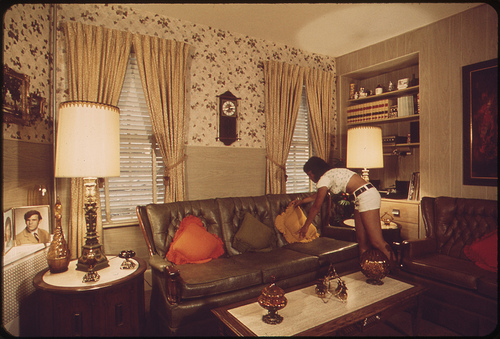Miss Thrifty10 January 31, 2013
Homemade leather food was one of the first posts I ever published on Miss Thrifty, nearly five years ago (yikes) when readers were still in single digits. Homemade leather food takes seconds to make, saves lots of pounds and I mixed up my latest batch today, so thought it was worth a repost.
The leather sofa and armchair in our front room are hand-me-downs from a kind relative, and are more than 20 years old. Of course the thing with leather is, you have to feed it. If you don’t – and this applies to furniture in particular – it dries out and cracks.
This is where leather food comes in, and it is great stuff: a mixture of oils and waxes, you rub it in with a cloth and it keeps leather clean, soft and sleek. The only downside is that it doesn’t come cheap, costing up to £8 a pot. You can buy leather wipes from the supermarket and these do the same job, but at £2.80 for a pack of 24, they don’t work out particularly economical either.
So here is how to make your own leather food, for pennies.
You will need:
Linseed oil.
White vinegar.
Two soft, clean cloths.
Add two parts oil to one part vinegar. Make up the quantity you need, but note that a little goes a long way. I find that two capfuls of oil and one of vinegar are sufficient for a three-seater sofa.
I buy white vinegar in bulk from Summer Naturals, because I have so many different uses for it around the house. If you don’t have linseed oil in the house, you can pick up a bottle from Amazon or your local DIY store for as little as £2. Raw linseed oil will do just fine, but boiled linseed oil is ok too, if that is what you have lying around: the only difference is that the boiled stuff is thicker, and dries more quickly.
You can make this up in a cup or a small mixing bowl from the kitchen: it’s only oil and vinegar, so it washes up easily.
To use, rub the mixture into the leather with the first soft, clean cloth. Leave it for a few minutes, then buff with the second cloth.
And that’s it! You’ll notice the difference immediately: even aged leather comes up soft and shiny.
Image credit: The U.S. National Archives.

10 Responses to “Make Your Own Leather Food”
Esther says:
Just discovered your wonderful site! Would that work for a vintage designer bag?
January 31, 2013 at 9:47 am
Miss Thrifty says:
Yes, absolutely! If it’s a patent leather bag, you can just use olive oil instead. 🙂
January 31, 2013 at 10:02 am
Esther says:
Thanks!
February 1, 2013 at 3:34 pm
Jorge Goias says:
Would this Wonderful Recipe work For a pair of Football Boots? I assume it would, but i would rather be safe, than sorry.
June 8, 2013 at 2:43 am
Miss Thrifty says:
Oh, I shouldn’t see why not! It’s very gentle, so little chance of ruining anything even if it doesn’t work as intended.
June 10, 2013 at 10:12 pm
[email protected] says:
What sort of white vinegar do you use. Does it matter Apple, Wine .? Can not get malt vinegar in Slovenia.
May 30, 2016 at 12:04 pm
Miss Thrifty says:
I use white vinegar in big 5-litre bottles from http://www.summernaturals.co.uk. It isn’t food grade vinegar. However if you aren’t a vinegar nut like me, any type of white (clear) vinegar would do – I’d go for white wine vinegar.
June 5, 2016 at 12:30 am
Nathan says:
Just so you know boiled linseed oil and raw linseed oil are not the same, boiled linseed oil has a hand full of nasty chemicals added to it to make it dry faster. Raw linseed oil is just the oil pressed from flax seeds.
October 16, 2016 at 8:04 am
Miss Thrifty says:
Oh, that’s good to know – thanks Nathan.
November 2, 2016 at 1:59 pm